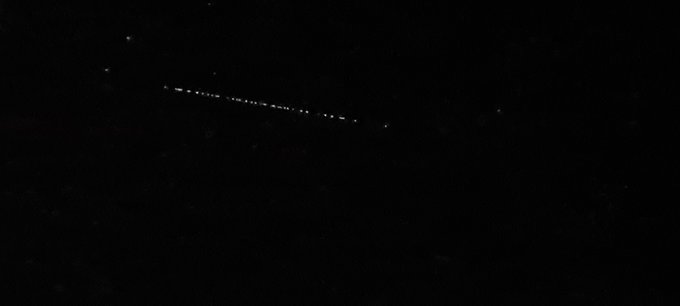GEORGE NEWS - A number of moving lights travelling neatly in a row across the night sky on Tuesday night, 22 February, had a group of friends braaiing in Wilderness flabbergasted, but it turned out to be satellites launched by Elon Musk's SpaceX company.
Wilderness resident Mike Leggatt says they saw something that looked like a faint white line in the sky which appeared from the south over the sea not long after sunset.
"It seemed to start getting longer and we realised it was moving towards us, although at what speed was unclear. It was moving up from the horizon towards the east. It got longer and longer and then broke into a chain of small lights that were somehow contained in a tube of sorts, looking like a string of LED lights. Then it faded into darkness as if the sky swallowed it up."
He had a sleepless night after that. "It was bizarre, something the likes of which I've never seen in my life before. It's the kind of thing that, had you not been sitting there with eight other people that saw it, you would really be asking yourself some serious questions about your sanity," said Leggatt.
The next day he heard local astronomer Case Rijsdijk's logical explanation for the strange sight.
Rijsdijk told George Herald that South Africa is the first country to be crossed overhead by satellites launched from the US. In the '50's South Africa was part of a programme to track launched space objects when they passed over the country.
He said the satellites travel low, at about 300km to 400km above the earth's surface. "They are launched in a straight line and later move apart from one another. They are not visible once they pass the reflecting rays of the sun."
Musk has a compilation of satellites that is causing a stir in the astronomic community because of the disturbance it causes in the night sky, according to Rijsdijk.
To date, SpaceX has launched 2 000 Starlink satellites and it has permission from the US government to launch many thousands more. It enables the provision of high-speed broadband internet across the world.
According to the SpaceX website, it launched 49 Starlink satellites from the Kennedy Space Center in Florida on 3 February. These satellites were however significantly impacted by a geomagnetic storm and 40 demised upon re-entering Earth's atmosphere.

'We bring you the latest Garden Route, Hessequa, Karoo news'















